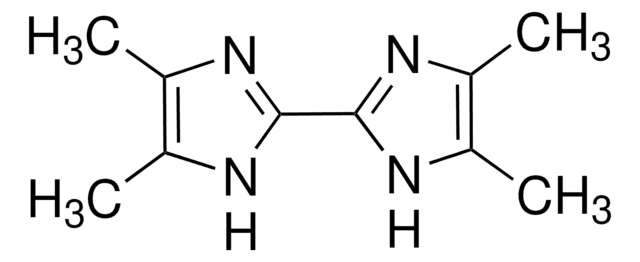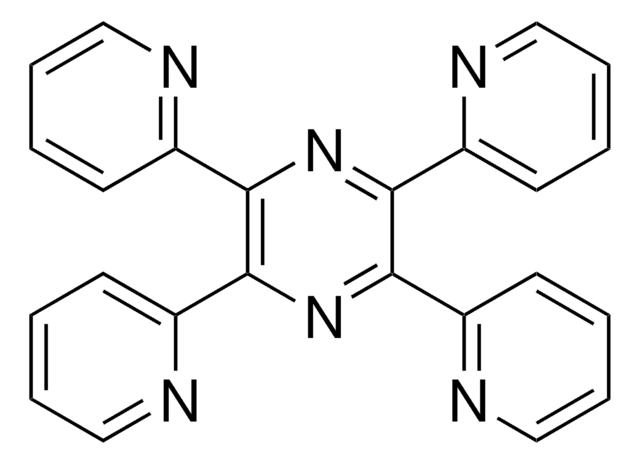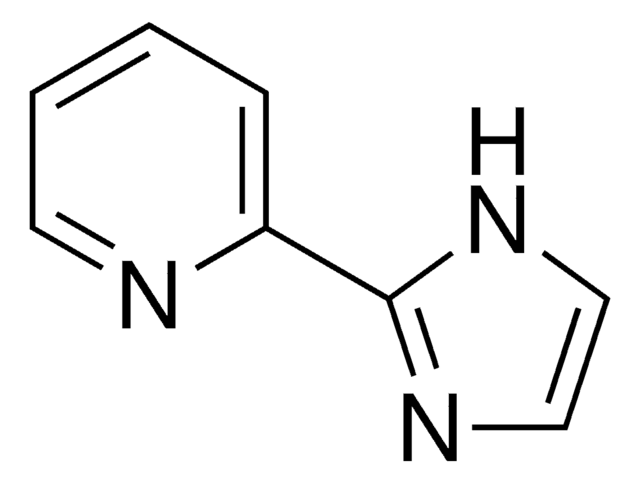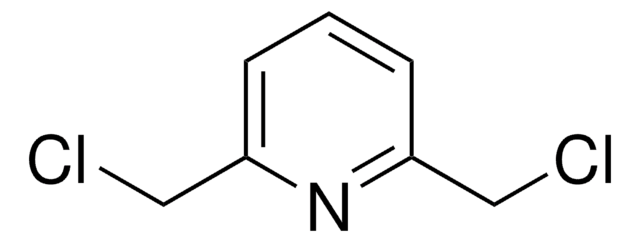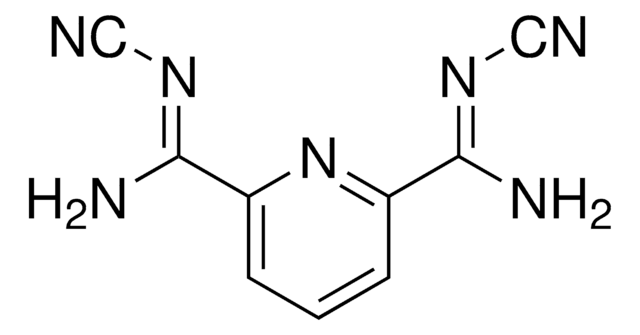All Photos(1)
About This Item
Empirical Formula (Hill Notation):
C19H13N5
CAS Number:
Molecular Weight:
311.34
MDL number:
UNSPSC Code:
12352100
PubChem Substance ID:
NACRES:
NA.22
Recommended Products
Quality Level
mp
>300 °C (lit.)
SMILES string
c1cc(nc(c1)-c2nc3ccccc3[nH]2)-c4nc5ccccc5[nH]4
InChI
1S/C19H13N5/c1-2-7-13-12(6-1)21-18(22-13)16-10-5-11-17(20-16)19-23-14-8-3-4-9-15(14)24-19/h1-11H,(H,21,22)(H,23,24)
InChI key
JBKICBDXAZNSKA-UHFFFAOYSA-N
Related Categories
General description
2,6-Bis(2-benzimidazolyl)pyridine acts as tridentate nitrogen donor ligand and reacts with UO2Cl2·3THF to form complexes. It is reported as an efficient anion receptor providing chemical shift and optical modification based signals for the detection of acetate ions. 2,6-bis(2-benzimidazolyl)pyridine is a V-shaped ligand and its picrate Mn(II) complex has been prepared. 2,6-Bis(2-benzimidazolyl)pyridine is also reported as an optical sensor useful for the aniline recognition.
Application
2,6-Bis(2-benzimidazolyl)pyridine may be employed as a chemosensor for the detection of fluoride ions. It may be used as a sensor for the detection of toxic metabolites of benzene such as phenol, hydroquinone, resorcinol, catechol and p-benzoquinone.
Signal Word
Warning
Hazard Statements
Precautionary Statements
Hazard Classifications
Eye Irrit. 2 - Skin Irrit. 2 - STOT SE 3
Target Organs
Respiratory system
Storage Class Code
11 - Combustible Solids
WGK
WGK 3
Flash Point(F)
Not applicable
Flash Point(C)
Not applicable
Personal Protective Equipment
dust mask type N95 (US), Eyeshields, Gloves
Choose from one of the most recent versions:
Already Own This Product?
Find documentation for the products that you have recently purchased in the Document Library.
Customers Also Viewed
Utilization of 2, 6-bis (2-benzimidazolyl) pyridine to detect toxic benzene metabolites.
Chetia B and Iyer PK.
Tetrahedron Letters, 48(1), 47-50 (2007)
Liming Zhang et al.
Spectrochimica acta. Part A, Molecular and biomolecular spectroscopy, 74(5), 1060-1063 (2009-10-17)
In this paper, an optical sensor, 2,6-bis(2-benzimidazolyl)pyridine, is reported to be highly selective towards aniline. A unique spectral response of 2,6-bis(2-benzimidazolyl)pyridine towards aniline is found, and a linear relationship between the sensor's emission intensity and the aniline's concentration is observed
Roy Copping et al.
Inorganic chemistry, 53(5), 2506-2515 (2014-02-18)
The reaction of UO2Cl2·3THF with the tridentate nitrogen donor ligand 2,6-bis(2-benzimidazolyl)pyridine (H2BBP) in pyridine leads to the formation of three different complexes: [(UO2)(H2BBP)Cl2] (1), [(UO)2(HBBP)(Py)Cl] (2), and [(UO2)(BBP)(Py)2] (3) after successive deprotonation of H2BBP with a strong base. Crystallographic determination
Bolin Chetia et al.
Spectrochimica acta. Part A, Molecular and biomolecular spectroscopy, 81(1), 313-316 (2011-07-12)
2,6-Bis(2-benzimidazolyl)pyridine, bbp, a simple tridentate ligand, is employed as a receptor for the recognition of anions. The binding of anionic guest species with bbp can be studied in short duration using UV/vis spectroscopy, fluorescence spectroscopy and (1)H NMR techniques at
2, 6-Bis (2-benzimidazolyl) pyridine as a chemosensor for fluoride ions.
Chetia B and Iyer PK.
Tetrahedron Letters, 49(1), 94-97 (2008)
Our team of scientists has experience in all areas of research including Life Science, Material Science, Chemical Synthesis, Chromatography, Analytical and many others.
Contact Technical Service